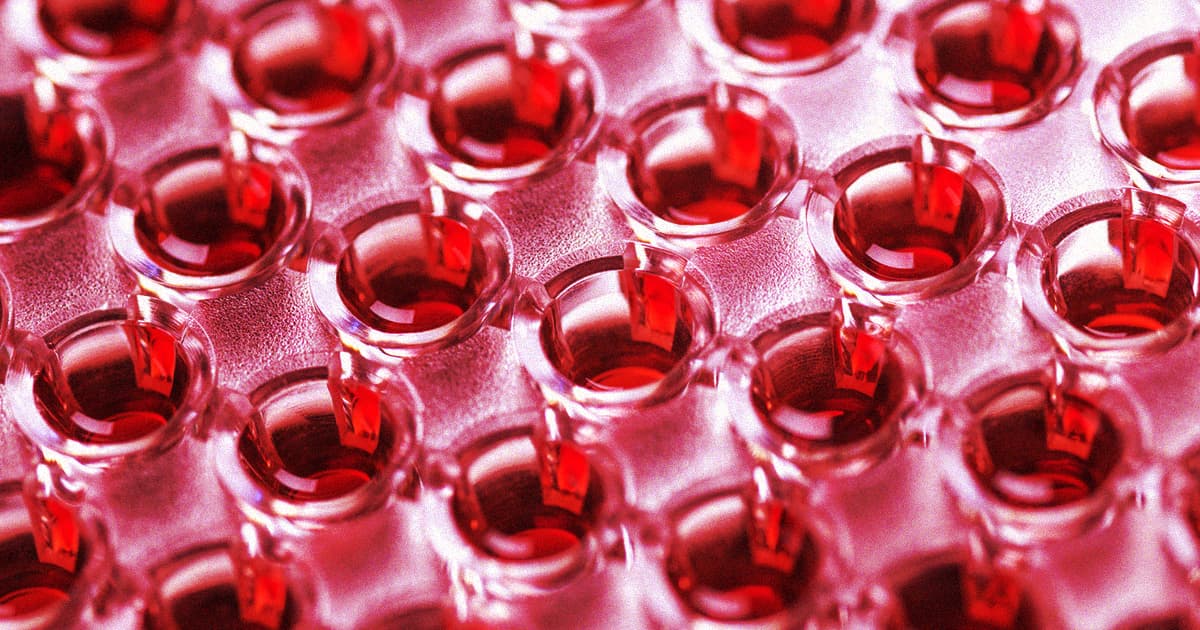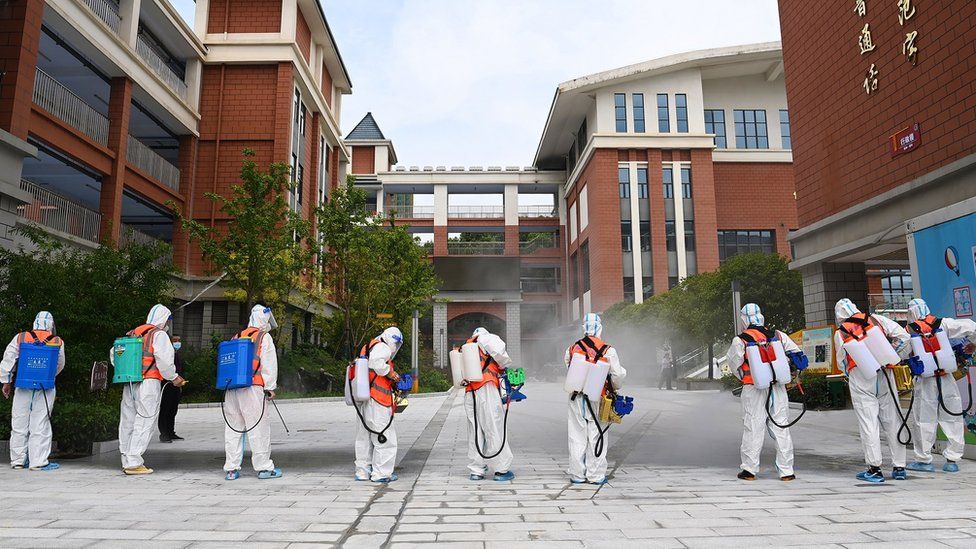THE BLOOD "ABSOLUTELY WILL CONTAIN VITAL CLUES."

In coming weeks, Chinese authorities say they plan to run tests on thousands and thousands of blood samples from Wuhan, the original epicenter of the COVID-19 pandemic.
There are up to 200,000 blood samples stored at the Wuhan Blood Center dating back to 2019, potentially giving officials access to a sort of real-time historical archive that could help reveal how the first coronavirus outbreaks began and spread, officials at China’s National Health Commission told CNN. The samples, which were previously identified as potentially being crucial evidence by the World Health Organization’s probe into China, have not yet been tested or examined.
Why the wait? Chinese authorities say that they were waiting for the end of a two-year grace period during which the blood samples could have become evidence in any lawsuits related to their donors or the donations themselves, according to CNN. Now that we’re almost at the two-year anniversary of the first COVID-19 cases, officials have started to prepare for the tests so that they can start as soon as possible.
“This provides the closest in the world we’ve seen of real-time samples to help us understand the timing of the outbreak event,” Council on Foreign Relations senior fellow for global health Yanzhong Huang told CNN.
If researchers are lucky, the blood samples will show when antibodies against the coronavirus first started to appear, which would serve as a proxy for when and where the pandemic began. But the biggest question, unfortunately, is whether Chinese authorities will handle the research with their usual level of secrecy — or if transparent reports will make it to the outside world.
The blood “absolutely will contain vital clues,” Columbia University epidemiologist Maureen Miller told CNN, but that won’t make a difference if no one else gets to access them.
“No one will believe any results that China reports unless there are qualified observers at the very least,” she added.
Covid: New WHO group may be last chance to find virus origins
Published19 hours ago

The team called the lab leak theory "extremely unlikely".
Media caption,Covid-19 and Wuhan: Why don't we know more?
But the WHO's director general, Dr Tedros Adhanom Ghebreyesus, later said the investigation had been hampered by a lack of data and transparency from China.
The proposed members of the Sago group include six experts who visited China as part of the previous team.
Aside from coronavirus, Sago will also look into the origins of other high-risk pathogens.
"Understanding where new pathogens come from is essential for preventing future outbreaks," said Dr Tedros said.
In a joint editorial in the journal Science, Dr Tedros and other WHO officials said "a lab accident cannot be ruled out".
EXPLAINER: Why the lab-leak theory is being taken seriously
Michael Ryan, the WHO's emergencies director, said Sago's work may be the "last chance to understand the origins of this virus".
The announcement of the new group comes as CNN reported that China was preparing to test tens of thousands of blood bank samples taken in the early months of the pandemic.
But Chen Xu, China's ambassador to the UN in Geneva, said Sago's work should not be "politicised".
"It is time to send teams to other places," he said.

WHO caught up in geopolitical fight
Tulip Mazumdar, Global Health Correspondent
Almost two years since the start of the pandemic, we still don't know how or when the deadly Sars-Cov-2 virus emerged. Investigating new viruses is always extremely complex, but scientists have been able to find the source of the two previous coronavirus outbreaks - both of which have emerged from animals.
It's been nine months since the last WHO-convened mission returned from Wuhan, saying a similar animal spillover was the most likely source of the pandemic. But questions continue to be raised about a potential accident at a Wuhan lab which studies coronaviruses and keeps thousands of bat samples. China has strenuously denied this.
The WHO says China still hasn't shared crucial data from the earliest days of the pandemic. The UN agency - which has been caught in the firing line between China and the US's bigger geopolitical fight on this issue - has been hardening its language on investigations into a lab leak theory.
The science is becoming increasingly politicised, with China so far refusing to allow international scientists back into the country.
It's hoped this new Sago body with experts from 26 different countries will be able to break this impasse, and finally get some much needed answers so the world can better prepare for future outbreaks.
Search for Covid's origins stalled, scientists say
Published25 August
US report on coronavirus origins 'inconclusive'
Published25 August
Scientists weigh up evidence over Covid's origins
Published10 July
Why the lab-leak theory is being taken seriously
Published27 May
Published19 hours ago

Questions around the origins of Covid-19 centre on Wuhan, where the virus first emerged
The World Health Organization (WHO) says a new taskforce may be the last chance to find the origins of Covid-19.
It has nominated 26 experts to join the body, the Scientific Advisory Group on the Origins of Novel Pathogens (Sago).
More than a year-and-a-half since the virus was detected in the Chinese city of Wuhan, the question of how it first emerged remains unclear.
The team will consider if the virus jumped from animals to humans in Wuhan markets or leaked in a lab accident.
China has strongly refuted the second theory.
In February, a WHO team tasked with investigating Covid's origins flew to China and concluded that the virus had probably come from bats but that more work was needed.
The World Health Organization (WHO) says a new taskforce may be the last chance to find the origins of Covid-19.
It has nominated 26 experts to join the body, the Scientific Advisory Group on the Origins of Novel Pathogens (Sago).
More than a year-and-a-half since the virus was detected in the Chinese city of Wuhan, the question of how it first emerged remains unclear.
The team will consider if the virus jumped from animals to humans in Wuhan markets or leaked in a lab accident.
China has strongly refuted the second theory.
In February, a WHO team tasked with investigating Covid's origins flew to China and concluded that the virus had probably come from bats but that more work was needed.
The team called the lab leak theory "extremely unlikely".
Media caption,Covid-19 and Wuhan: Why don't we know more?
But the WHO's director general, Dr Tedros Adhanom Ghebreyesus, later said the investigation had been hampered by a lack of data and transparency from China.
The proposed members of the Sago group include six experts who visited China as part of the previous team.
Aside from coronavirus, Sago will also look into the origins of other high-risk pathogens.
"Understanding where new pathogens come from is essential for preventing future outbreaks," said Dr Tedros said.
In a joint editorial in the journal Science, Dr Tedros and other WHO officials said "a lab accident cannot be ruled out".
EXPLAINER: Why the lab-leak theory is being taken seriously
Michael Ryan, the WHO's emergencies director, said Sago's work may be the "last chance to understand the origins of this virus".
The announcement of the new group comes as CNN reported that China was preparing to test tens of thousands of blood bank samples taken in the early months of the pandemic.
But Chen Xu, China's ambassador to the UN in Geneva, said Sago's work should not be "politicised".
"It is time to send teams to other places," he said.

WHO caught up in geopolitical fight
Tulip Mazumdar, Global Health Correspondent
Almost two years since the start of the pandemic, we still don't know how or when the deadly Sars-Cov-2 virus emerged. Investigating new viruses is always extremely complex, but scientists have been able to find the source of the two previous coronavirus outbreaks - both of which have emerged from animals.
It's been nine months since the last WHO-convened mission returned from Wuhan, saying a similar animal spillover was the most likely source of the pandemic. But questions continue to be raised about a potential accident at a Wuhan lab which studies coronaviruses and keeps thousands of bat samples. China has strenuously denied this.
The WHO says China still hasn't shared crucial data from the earliest days of the pandemic. The UN agency - which has been caught in the firing line between China and the US's bigger geopolitical fight on this issue - has been hardening its language on investigations into a lab leak theory.
The science is becoming increasingly politicised, with China so far refusing to allow international scientists back into the country.
It's hoped this new Sago body with experts from 26 different countries will be able to break this impasse, and finally get some much needed answers so the world can better prepare for future outbreaks.
Search for Covid's origins stalled, scientists say
Published25 August
US report on coronavirus origins 'inconclusive'
Published25 August
Scientists weigh up evidence over Covid's origins
Published10 July
Why the lab-leak theory is being taken seriously
Published27 May
No comments:
Post a Comment